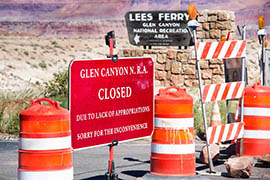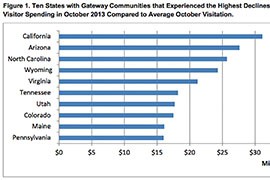Cronkite News has moved to a new home at cronkitenews.azpbs.org. Use this site to search archives from 2011 to May 2015. You can search the new site for current stories.
Government shutdown cost Arizona $27 million at national parks
WASHINGTON – Arizona saw a $27 million drop in spending at its national parks during October’s partial federal government shutdown, with $17 million in losses at Grand Canyon National Park alone, according to a new report.
The Department of the Interior report released Monday said that Arizona had the second-highest losses in the nation for the shutdown, trailing only California, which lost $31 million. The losses were based on park spending in October 2013 compared to the average park spending for the same month over the preceding three years.
The estimated-loss report was one of two from the department Monday, which also released its annual report on the economic impact that national parks had on local communities in 2012.
That report said 282 million park visitors spent more than $14.7 billion in 2012, supporting 243,000 local jobs in hotels, restaurants, bars and other tourism-related businesses. In Arizona, park visitors spent $745.6 million in 2012, supporting 11,470 jobs, according to the report.
“Parks are economic engines for their communities,” Interior Secretary Sally Jewell said during a conference call on the release of the two reports. “They bring in dollars from visitors to keep communities going strong.”
But the 16-day government shutdown cut sharply into that revenue stream, even in states like Arizona which eventually paid the federal government to reopen the Grand Canyon.
Jewell said deals had to be reached with each state during the shutdown to fund park openings, and disputed claims that the department can refund that money now to states, saying that is a decision only Congress can make. But she tried to find a bright side to the shutdown.
“A silver lining in all this is that now people can see just how important their parks are to their way of life,” Jewell said.
That statement was echoed by Kevin Dahl, spokesman for the Southwest office of the National Parks Conservation Association.
“It’s no surprise to those who pay attention that we were hit that badly,” Dahl said of the local economic impact of the parks’ shutdown. “A lot of our hotels, restaurants, and outfitters depend on those parks being open.”
Rep. Paul Gosar, R-Prescott, agreed that the national parks are important to local economies, calling the loss of revenue is “tragic” for those who depend on it. But he laid the blame for the shutdown squarely on President Barack Obama and congressional Democrats.
“The outsized impact of President Obama’s government shutdown on Arizona is an absolute shame,” Gosar said in an emailed statement Monday. “The hardship this inflicted on families in Arizona, and throughout the country, is tragic. I sincerely hope that President Obama and Senate Democrats will not put the American people at risk again.”
The Senate did pass a budget to keep the federal government operating in October, but House Republicans tried to send it back to the Senate with provisions to block implementation of the Affordable Care Act, or Obamacare, that took effect Oct. 1. The Senate and White House had insisted that Obamacare was nonnegotiable, and when neither side would budge, the government was forced to partially shut down.
A deal was reached on Oct. 16 to extend the budget at previous levels through early 2014, while budget negotiations continued. The deal also raised the debt ceiling, allowing the government to continue paying its bills on the eve of what some feared could be a government default.
Dahl said an overwhelming majority of Americans want to see parks fully funded, without such interruptions.
“In all the independent polling that I have seen, no matter if you’re Republican or Democrat, around 90 percent want these parks to stay completely open,” he said.
While the budget stalemate is over, Dahl said the struggle is not over yet. Budget cuts from recent years have created a maintenance backlog that he is fears will make parks less tourist-friendly if they are not addressed.
Jewell expressed a similar concern, saying national parks have an $11.5 billion maintenance backlog that will need strong tourism and a restored budget to be met.








